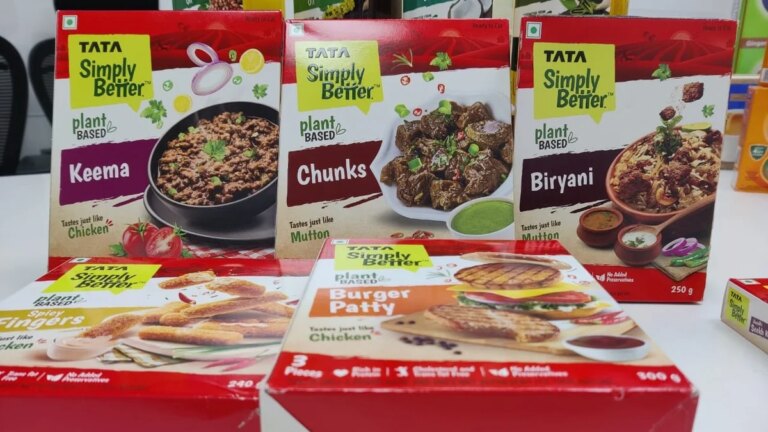ITC Corp. and Tata Consumer Products Ltd. have decided to exit the plant-based meat market as the hype surrounding the category has started to die down. The packaged consumer goods companies believe that it is not economically viable to operate in this niche category as they are not seeing enough profits.
Sunil D’Souza, Managing Director and CEO, Tata Consumer Products, said in an exclusive interview with NDTV Profit, “We launched plant-based meat because the trend is growing globally. “We’ve seen it spread across the country, but this category hasn’t caught on yet.” Due to uncertainty about future demand, Tata Consumer has decided to pivot from the fake meat segment and instead focus on other high-margin categories, such as the millet-based portfolio, he said.
Meanwhile, ITC Ltd. also stopped selling plant-based meat products. Consumers can no longer find vegan meat products in retail stores, e-commerce platforms like BigBasket, or ITC’s own online store. However, some variations are still available for institutions.
” [plant-based meat] “This segment is still at a very early stage and is developing in India. We will continue to monitor developments in this segment closely,” Ash Faikhi, Head of Frozen Foods Business, ITC Ltd., told NDTV Profit. We will monitor and evaluate.”
Sales of plant-based meat products that mimic the taste of chicken soared in the early months of the coronavirus pandemic. A number of startups, including Blue Tribe, Shaka Harry, and Imagine Meats, are increasing the demand for fair living, especially among younger consumers and big cities, as plant-based diets gain popularity and acceptance in the world’s largest vegetarian nation. It has gained a foothold in gaining popularity and acceptance among consumers who are sending their products. High disposable income.
Celebrities have also started investing in plant-based food companies, including Blue Tribe, backed by Indian cricketer Virat Kohli and actor Anushka Sharma, and Shaka Harry, backed by MS Dhoni. Bollywood actors Riteish and Genelia Deshmukh are promoting Imagine Meets.
This megatrend quickly caught the attention of two consumer goods giants, ITC and Tata Consumer, who entered the fray in 2022. While ITC has launched meat-free burger patties and nuggets under its Master Chef Incredibles brand, Tata Consumer has started selling vegan products. Variations of seekh kebabs and spicy fingers are now available under the new brand “Tata Simply Better”.
The entry of ITC and Tata into the market has sparked optimism among analysts who see great potential. In a September 2021 report by Nirmal Bang, the plant-based meat market is projected to reach $500 million by 2024. However, despite the initial buzz, the growth of this new category has not met expectations. Statista predicts that his current market size is $160 million and that by 2027 he will reach $260 million.
Some consumers are put off by the overwhelming taste of artificial meat, but what worries them more is the price. For example, ITC’s 520 gram pack of authentic grilled chicken patties was priced at Rs 375, while its 330 gram vegan burger patty was priced at Rs 630. Simply put, plant-based options are nearly three times more expensive than their animal-based counterparts. .
Some consumers are also skeptical that plant-based meat is a healthier alternative compared to traditional protein sources such as dairy products.
“There are so many delicious and nutritious protein options…why would we need a processed alternative?” laments Maya, 29, who became vegan five years ago. “Even for parents who follow a vegetarian diet, the concept of plant-based meat is completely unappealing.”
The lackluster response to the plant-based meat category in India has prompted FMCG players to try to navigate the quagmire. “But if this trend returns tomorrow, we are ready to respond as we are one of the few companies in the country with adequate manufacturing and distribution capabilities,” TCPL’s D’Souza said. Told.
US-based alternative meat brand Beyond Meat was also forced to exit the market in 2022, just a year after partnering with Arana Group to distribute sausages and burgers in India, due to poor sales in India. Ta.
Meanwhile, the simulated meat industry is struggling around the world, with companies such as Impossible Foods and Beyond Meat struggling despite smaller peers Hooray Foods and Noday closing stores. You’re losing revenue.
Now Impossible Foods, known for its vegan burgers, an alternative to beef burgers, is reportedly planning a rebrand to “appeal to the carnivorous desires of meat eaters.”
Anand Nagarajan, co-founder and CEO of Shaka Harry, acknowledged that widespread acceptance of plant-based meat in the country has not progressed as quickly as initially expected. In fact, dairy alternatives are the only area that is showing promising growth potential.
“That’s probably because plant-based products aren’t being marketed in the best way possible,” he says.
He says vegan meat and plant-based proteins need an Indian context and narrative. “We cannot use what is used in the West and expect high adoption. This category has to fit into the context of our cuisine and culture.”
The elitism often associated with plant-based analogs also turns off many consumers. To combat this, the Bangalore-based startup has introduced a 13-gram plant-based sandwich patty priced at Rs 99. It also hopes to achieve its goal by introducing cheaper versions of plant-based products priced between Rs 99 and Rs 199. To a wider range of consumers.
Nagarajan believes that “clean eating as a habit is here to stay” and is optimistic that sales in 2025 will increase 2.5 times from last year.

